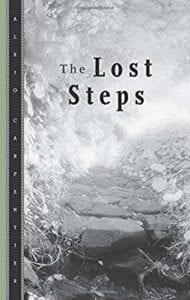
The Lost Steps
by Alejo Carpentier
translated by Harriet de Onis
University of Minnesota Press
upress.umn.edu
The following is an excerpt from the book’s introduction by Timothy Brennan, Professor of Cultural Studies and Comparative Literature at the University of Minnesota.
Translated into twenty languages, and published in more than fourteen Spanish editions, The Lost Steps (Los pasos perdidas, 1953) is Carpentier’s most heralded novel. Robert Church, a London-based critic, wrote in the New Chronicle that “this book belongs alongside Moby-Dick and The Plumed Serpent. It is much, much more than literature.” In Paris,
Andre Rousseau wrote in Le Figaro Litteraire that “[Carpentier’s] work has a profound significance in contemporary literature. The Lost Steps is the greatest novel to have appeared in Latin America in our time.” On the basis of a reading of the novel, Edith Sitwell proclaimed Carpentier “without a doubt one of the greatest living writers.” In 1956, the book received France’s prize for the best foreign novel of that year.
Whether highbrow or middlebrow, many different audiences have found irresistible its portrayal of the paralyzed artiste among villagers in the heart of a South American jungle. The actor Tyrone Power had read the novel in London, and set about immediately to bring it to the screen. He went as far as buying the rights to the film, setting up a production schedule, and hiring Irving Shaw to direct it. Ava Gardner was to play Mouche and Gina Lollobrigida, Rosario. Power died, however, before the filming ever took place.
Published when Carpentier was forty-nine, the book nevertheless appeared toward the beginning of the author’s ventures into fiction writing. … The title itself is an allusion to Andre Breton’s volume of essays, Les pas perdus (1924), which means, significantly, both “the lost steps” and “the not lost.”
… In Carpentier’s “American Cycle” of novels, The Kingdom of This World and Explosion in a Cathedral are resolute treatments of history; The Lost Steps, though, is an analysis of time itself. Its musician narrator lives by the metronome, “the ultimate Measurer of Time’s passing.” He is busy wasting his life, meandering in New York, toying with the idea of defrauding his benefactors with fake scholarship on the “origins of primitive music.” He is, of course, a version of Carpentier himself—at least, some doppelganger that Carpentier, in his own mind, feared he might become. Even the denouement revolves around a musical score that only a passage back through time makes possible. If The Lost Steps is Carpentier’s way of purging his own past, its eloquence comes from the terrified recognition of what he might have been. The novel is a self-condemnation. And yet, only by composing it was Carpentier able to avoid the narrator’s fate.
From The Lost Steps by Alejo Carpentier, University of Minnesota Press. Reprinted with permission. All rights reserved.
